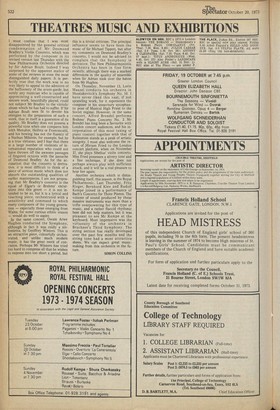THEATRES MUSIC AND EXHIBITIONS
I must confess that I was most disappointed by the general critical condemnation of Mr Desmond Bradley's Violin Concerto, which was performed by the composer in its revised version last Thursday with the New Philharmonia Orchestra directed by Sir Adrian Boult. Indeed I was surprised by the apparent malice of some of the reviews in even the most distinguished daily papers. It is perfectly true that the work .was in no way likely to appeal to the admirers of the buffoonery of the avant-garde; but surely any musician who is capable of appreciating a well-constructed and sincere work, beautifully played, could not subject Mr Bradley to the vitriolic abuse which he has had to suffer. If Sir Adrian BouIt sees fit to devote his energies to the preparation of such a work, that in itself is a guarantee of its quality. Mr Bradley does not possess a powerful tone when one compares him with Menuhin, Heifetz or Francescatti, and his bowing has not the fluency of a Nathan Milstein, for example, but he is a true virtuoso, and I fear that there is a large number of violinists of international reputation who could not have thrown off the awsome passages of fingered octaves with the panache of Desmond Bradley. As for the accusation that the concerto is derivative, it is most difficult to think of a piece of serious music which does not absorb the outstanding qualities of earlier masterpieces. I am not proposing that Mr Bradley's concerto is the equal of Elgar's or Brahms' excursions into this genre — it is not intended to be so, but it is a lyrical and touching piece, orchestrated with a sensitivity and command to which many composers of the young generation — especially those emerging from Wales, for some curious ethnic reason — would do well to aspire.
In the same concert, Owain Arwe Hughes conducted the Symphony, although in fact it was really a sinfonietta, by Geoffrey Winters. This is an attractive piece, colourfully orchestrated, and unlike much modern music, it has the great merit of concision. Perhaps Mr Winters has tried too hard to compress all that he wishes to express into too short a period, but this is a trivial criticism. The principal influence seems to have been the music of Sir Michael Tippett, but after my comments on Desmond Bradley's concerto, I would not be advised to complain that the Symphony is derivative. The New Philmarmononia Orchestra has been in fine form recently, although there was a marked differences in the quality of ensemble when Sir Adrian took over the baton from Mr Hughes. On Thuesday, November 13, Lorin Maazel conducts his orchestra in Shostakovitch's Symphony No. 10. I have never liked this vast, if not sprawling work, for it represents the composer in his unsavoury sycophantic pose of Musical High Priest to the Soviet regime. However, in the same concert, Alfred Brendel performs Brahms' Piano Concerto No. 2. Mr Brendel has long been a favourite with London concert audiences, and his interpretation of this most taxing of piano concerti together with that of Rubinstein stands as a peak of artistic integrity. I must also welcome the return of ,Miriam Fried to the London concert platform, when on November 27, she plays Sibelius' violin concerto. Miss Fried possesses a silvery tone and a fine technique, if she does not perhaps always play with sufficient attack, and it will be a real pleasure to hear her again. Another orchestra which is distinguishing itself, this season, is the Royal Philharmonic. Last Thursday, Fritz Rieger, Bernhard Klee and Rudolf Kempe joined in a performance of Bach's Concerto for Three Pianos. The volume of sound produced by these massive instruments was more than a trifle overpowering for this type of music, and a rather flaccid rhythmic base did not help matters, but it was pleasant to see Mr Kempe at the keyboard. Most impressive was the virtuosity of the orchestra in Bruchner's Third Symphony. The string section has really developed over the past few months and the string tone had a most attractive sheen. We can expect great musicmaking from this orchestra in the future.
ALDWYCH 896 6404. RSC's 1973/4 London Season: THE ROMANS — Shakespeare's 4 Roman Plays. CORIOLANUS (Fri, Thur. 7.30, Mon. 8.45): JULIUS CAESAR (Sat. 2.0 Tues. 1.30, Oct. 28); ANTONY & CLEOPATRA (Sat. 7.30. Tues, 8.45. Oct. 27 mat.); TITUS ANDRONICUS (Wed. 6.45, Oct. 27) Also Pinter's LANDSCAPE with A SLIGHT ACHE (Oct. 31 Nov. 1). RSC also at The Place — see under P.
THE PLACE, Dukes Rd., Euston 387 0031 RSC In special new play season: Friday 8.00 Athol Fugard's HELLO AND GOOD. EYE. Sat. 8.0 SYLVIA PLATH. All seats 21.00 (Plus 10p non-members).


































































 Previous page
Previous page